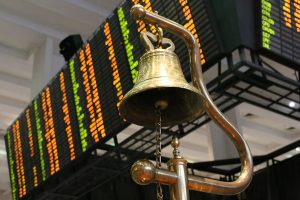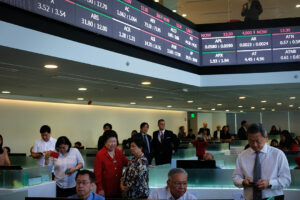Are politics and central banking starting to cross paths in Southeast Asia?

In late April, Thai Prime Minister Srettha Thavisin met with Thailand’s largest banks to ask them to lower the loan rates they charge to their customers, particularly households and small businesses. Srettha had decided to take his case directly to the banks after several months of openly lobbying the Bank of Thailand to cut interest rates, but which only seemed to tighten the latter’s resolve not to do so. The prime minister and his For Thais (PT) party believe interest rates are too high given the country’s low inflation rate. From September to March, headline inflation was negative, only rising to 0.19% this April. The central bank’s target rate is 1% to 2%. The numbers don’t tell the whole story, however, because broad subsidies on fuel and electricity help keep prices down.
Bangkok is struggling to raise growth for several reasons, including a delayed budget, a massive consumer stimulus program that can’t get off the ground (yet), a slow return to pre-pandemic tourism levels, and uneven export growth. But in a country where household debt to GDP is at 91%, targeting interest rate cuts is attractive to any politician, on the belief that the relief to consumers would be significant and immediate, and that more money in their pockets would eventually translate into spending and growth. And the faster the economy expanded, the prime minister’s thinking goes, the quicker the household debt-to-GDP ratio would go down.
The Bank of Thailand (BoT) has, however, refused to go along. BoT governor Sethaput Suthiwartnarueput has publicly and directly rejected the prime minister’s assertions, saying they would decide based on what is “most appropriate for the economy, rather than considerations about trying to ease political or other pressures.” The central bank chief said that sluggish growth had to do with things other than interest rates and that it was mindful of not encouraging people to take on additional debt by loosening monetary policy.
On Friday last week, Paetongtarn Shinawatra, the daughter of former prime minister Thaksin Shinawatra, poured more fuel on the fire. She blamed central bank independence for the government’s difficulties in solving the country’s economic problems. Srettha, as a former real estate developer and with only a short history in politics, may have had qualms about taking on the central bank as an institution. Paetongtarn, on the other hand, is not just any politician. Although she holds no cabinet or elective position, she leads the For Thais party, which is at the head of the government coalition. Her father has said that she would likely contend for the prime minister position at the next election, which is due by 2027 but could happen earlier if Srettha falters.
She is, of course, her father’s daughter. In 2001, Thaksin lobbied BoT governor Chatumongkol Sonakul for the opposite, which was to raise interest rates to reward depositors. Thailand’s economy then was still weak and Chatumongkol wanted to keep rates low to spur a recovery. For months, the two apparently debated outside of the public eye. It came to a head in May that year, as the New York Times reported, “Prime Minister Thaksin Shinawatra of Thailand found a very public way to make sure he would have the last word: yesterday, he dismissed the banker.”
Sethaput is in a much better position. A 2008 law improved central bank independence and the BoT governor can only be dismissed for serious cause. Paetongtarn’s statement, therefore, raises the question of whether she is issuing a veiled threat to at some point amend the 2008 Bank of Thailand Act. PT today is not as dominant as Thais Love Thais (TRT), Thaksin’s party, was in the 2000s. It depends on an equilibrium between former opponents to stay in power and a serious economic misstep may doom its chances in the next election. Thus, revising the law could be difficult.
Thailand’s central bank is, however, not alone in feeling some political heat. Two weeks ago, Indonesia’s central bank, Bank Indonesia (BI), unexpectedly raised its benchmark by 25 basis points to a seven-year high of 6.25%. In the words of BI governor Perry Warjiwo: “The interest rate increase is to strengthen the rupiah’s exchange rate stability against the possibility of worsening global risks.” This time, the reaction came from Dradjad Wibowo, the chief economic adviser of President-elect Prabowo Subianto. He said it was wrong to raise rates because the country needed a supportive monetary policy to maintain growth, and that he hoped there would be “coordination between BI and the government so that monetary policy aligns with economic expansion.”
Even then-Secretary of Finance Benjamin Diokno would occasionally chime in on his opinions regarding interest rates.
This raises the question of whether we could be entering a time when politicians start to become increasingly vocal about monetary policy and, in the case of Thailand, apparently issuing veiled threats on central bank independence. Changing institutional rules is never easy and we can always argue that these are low probability events because of the strong momentum for independence that was built up during the Asian financial crisis. But if anything, events of the last decade or so have taught us that ideas that were broad consensus two decades ago — deregulation, immigration, trade — are vulnerable to populist impulses.
The Wall Street Journal reported on July 26 that officials from the former Trump administration have been quietly drafting proposals for the presumptive Republican nominee to erode the independence of America’s central bank, the Federal Reserve. These proposals, according to the WSJ, range from the incremental to a “long-shot assertion that the president himself should play a role in setting interest rates.”
It would take too long to discuss the principles of central bank independence here, but a recent paper by Hassan Afrouzi, Marina Halac, Kenneth Rogoff, and Pierre Yared highlight its importance. They say the world may be entering a new phase, where the “factors that for decades had made it easier to maintain low average inflation, including globalization, demographics, and fiscal restraint, may have gone into reverse.” We see this in Asia today, where some hyper-efficient production chains that were once predominantly in China are starting to become unbundled, i.e., relocated and distributed, because of geopolitics and the lessons from the pandemic. Logistics challenges, less-than-efficient alternatives to China, and the friction brought about by more complex production systems are likely to add to the cost of production and reduce the benefits from technological improvements.
Global inflation will, therefore, likely be higher in the past. At the same time, they say, the pressure on budgets will increase due to defense spending, higher public debt servicing levels, and the green transition. Asset prices could also become more volatile. To maintain macroeconomic stability and prevent future inflation shocks from damaging economies too much, we need central banks that can respond credibly when politicians cannot or, worse, are driven by perverse incentives — which is why their independence is needed.
Central banks cannot, however, sit idly by and assume that what they see and need to do, in the context of the challenges that our economies face, are commonly and widely understood. Central banks have learned to speak well to the sectors they regulate and within the spheres of the experts that understood them. They can take that course, in the hope that there will still be a strong vanguard that understands and openly defends their independence. Or they can become more open in communicating with the public, but that has its own risks and challenges.
Douglas Holmes wrote a wonderful book a few years ago, where he said that linguistically modeling the economy is a primary component of economic action, especially the action of central bankers who constantly deal with expectations. Whether central banks need to say more with structural inflation seemingly headed higher and geopolitical uncertainties increasing will therefore be a key question. And probably a political one as well.
Bob Herrera-Lim is a managing director at Teneo, a New York-based consulting firm that advises companies and investors globally. He covers all of Southeast Asia for the firm’s clients. He is also a fellow of the Foundation for Economic Freedom.




